
PMAG art exhibition
The Centre for Crime, Justice and Security were delighted to host the Make Plastics History Event at the Potteries Museum on the 20th April. The event, funded by the British Academy, aimed to educate children and families in plastic pollution and ensure the future protection of our planet in a proactive and positive manner. The document below provides an overview of the research that has underpinned the project so far.
The images below show the exhibits that was commissioned of the day of the event. Our resident microplastics artist, alongside the families of Stoke-on-Trent, were able to come together and produce these stunning works of art from discarded waste.


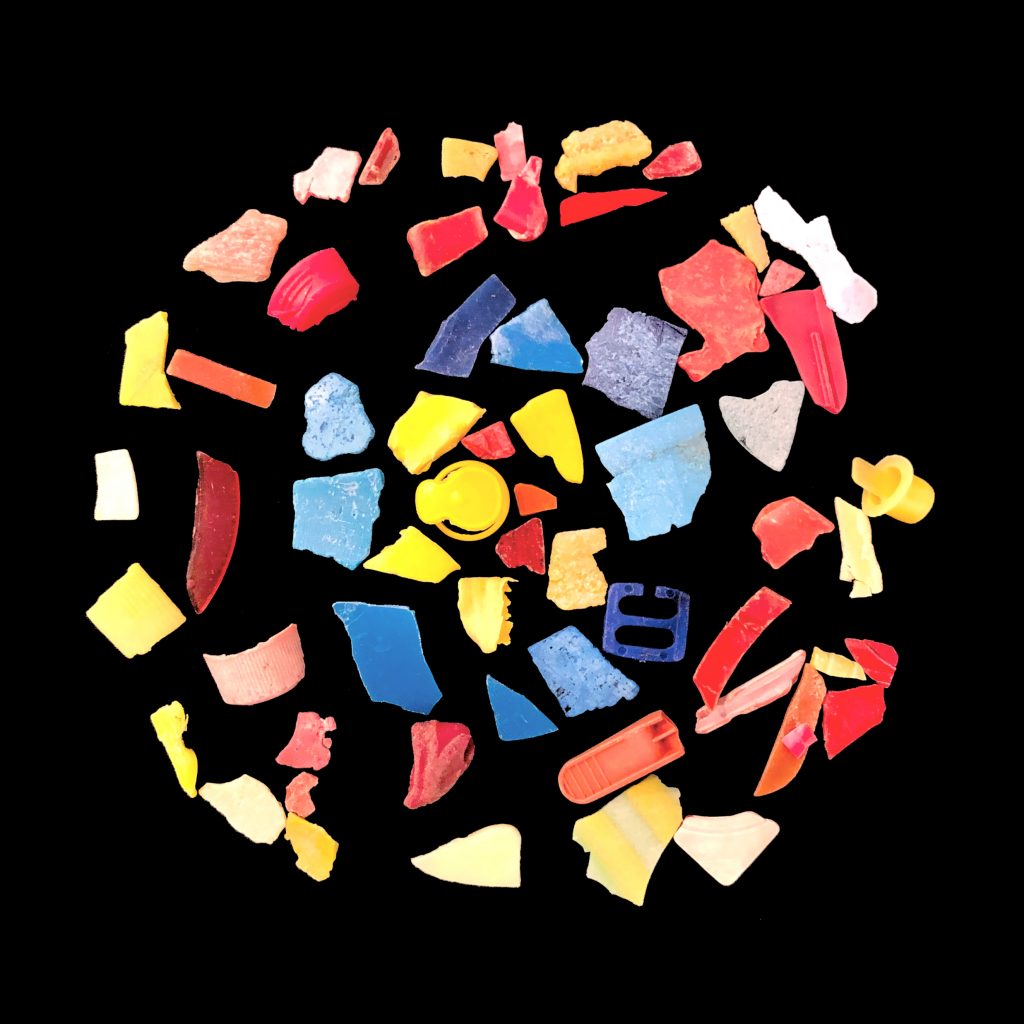



CCJS Burial Group relaunch
The Centre for Crime, Justice and Security is delighted to announce the relaunch of the Burial research group.

About us
The Burial Research Group undertakes a multitude of research activities relating to the investigation of buried human remains and the grave environment. We are a diverse group of enthusiastic researchers from forensics, biological anthropology, archaeology, chemistry, and environmental science, who believe interdisciplinary research can solve complex problems within our disciplines and improve best practice.
Aims of the Burial Research Group
The central aims of the Burial Research Group are to:
- Develop and refine new techniques in the location, analysis, and interpretation of human remains and taphonomic processes in a range of terrestrial and aquatic environments;
- conduct interdisciplinary research to answer questions that are pertinent in forensics, biological anthropology, archaeology, and chemistry;
- identify and champion best practice within our relevant disciplines.
Researchers
Dr Kirsty Squires
Dr Alison Davidson
Simon Cooper
Jessica Gill
Emily Wales-Ferguson
Publications
- Squires, K., Davidson, A., Cooper, S., Viner, M., Hoban, W., Loynes, R., Zesch, S., Rosendahl, W. Lindauer, S., Greco, C. and Piombino-Mascali, D. 2024. A Multidisciplinary Investigation of a Mummified Egyptian Head and Analysis of its Associated Resinous Material from the Salinas Regional Archaeological Museum in Palermo (Sicily). Journal of Archaeological Science: Reports 55: 104525. https://doi.org/10.1016/j.jasrep.2024.104525.
- Balta, J., Blom, G., Davidson, A., Perrault, K., Cryan, J., O’Mahony, S. and Cassella, J. (2020) Developing a quantitative method to assess the decomposition of embalmed human cadavers, Forensic Chemistry 18: 100235. https://doi.org/10.1016/j.forc.2020.100235
- Donnelly, L.J., Cassella, J., Pirrie, D., Dawson, L., Blom, G., Davidson, A., Arnold, P., Harrison, M. and Hope, C. (2018) Analysis of Soil Following a Police Led Open Area Search and the Recovery of a Cold Case Homicide Grave. Geological Society Special Publication 492. ISSN 0305-8719
Contact
If you are a researcher and would like to join the Burial Research Group or would like more information about our work, please contact Dr Kirsty Squires (Kirsty.Squires@staffs.ac.uk) or Dr Alison Davidson (A.R.Davidson@staffs.ac.uk).
International CCJS Project makes the headlines
Staffordshire University, in collaboration with the Wildlife Forensics Academy, have been in the news this week for their ground breaking work tackling wildlife poaching. For more information please click the link below.
See: Unique training centre needs to help poachers get hold | Maroela Media
Centre Monkey Dust project highlighted in the Sentinel
A current Centre for Crime, Justice and Security project focusing on Monkey Dust had been highlighted in the Sentinel this month. Please click the link below to read more about the exciting work that has been carried out.
Journeys in to Digital Forensics
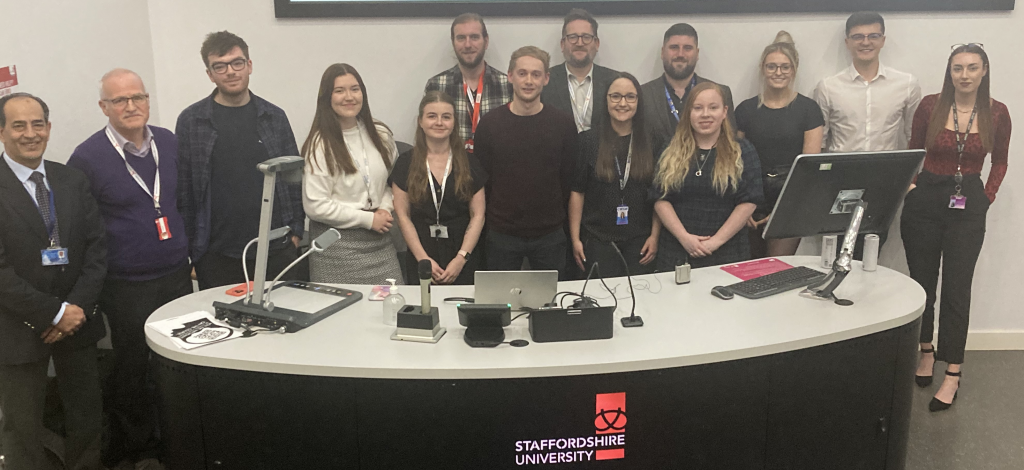
Brought to you by the Staffordshire Forensic Partnership, the School of JSS and the Centre for Crime Justice and Security.
Students from JSS have an enviable record of employability after leaving University. Add to that the work from the school in the world of digital forensics and that makes for students who are better equipped to gain these sought after roles.
In this our fourth joint Journeys themed employability seminar we hear from recently graudated students from the School of JSS as they talk about their journeys into Digital Forensics.
Learn tips and tricks in securing that job post graduation and what you can do to make your CV be the one that stands out from the crowd.
Hear about potential openings in the coming months from their employers.
Hosted by Dean Northfield and Martyn Hordern
Click to register- Journeys in to Digital Forensics Tickets, Wed 24 Jan 2024 at 11:00 | Eventbrite
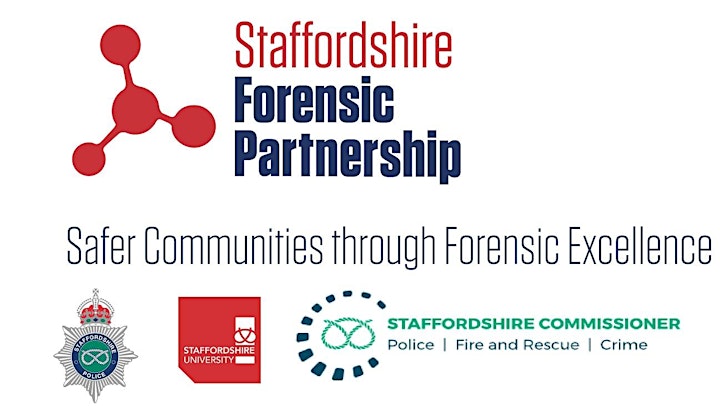

Action on Poverty Conference 2023
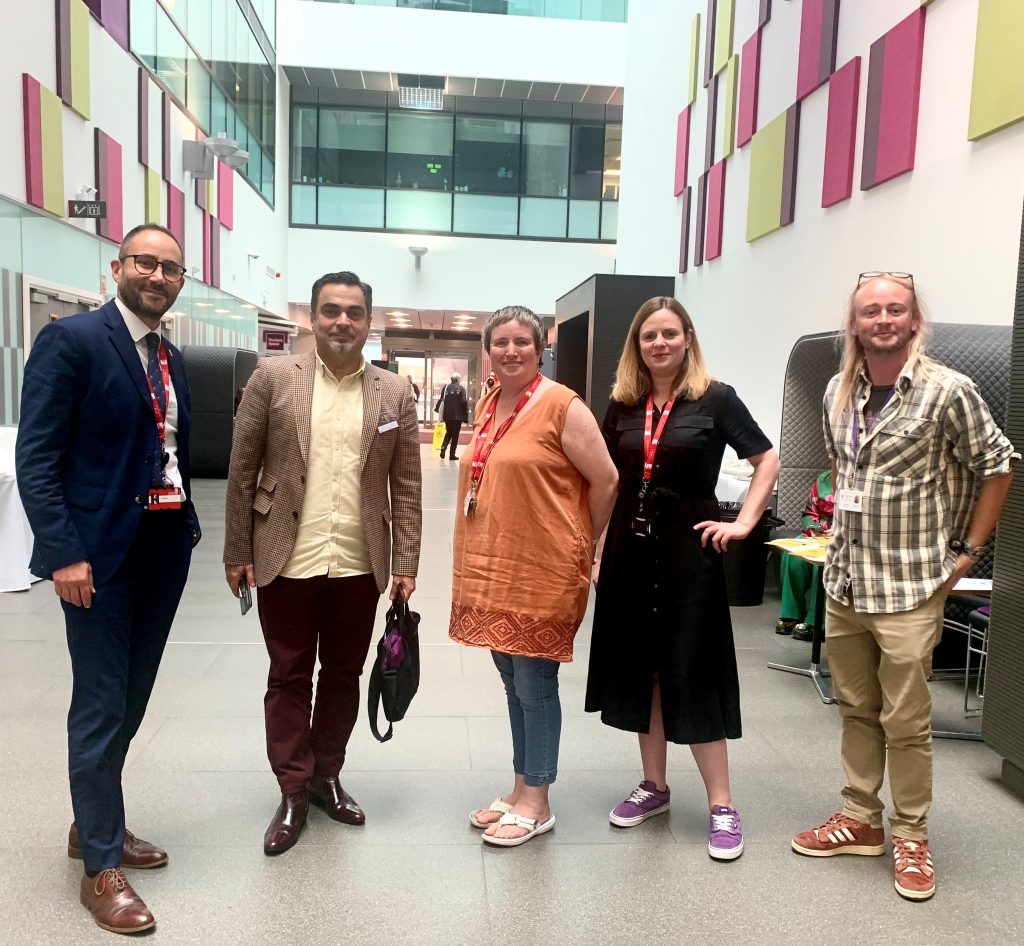
The Action on Poverty team largely supports the social justice arm of our CCJS research work and they also beginning to deliver an MA course in Leadership in Action on Poverty. They recently spearheaded an Action on Poverty conference in September (18th and 19th September 2023) spanning across two days, bringing together two research centres (CCJS and CHAD) and the Connected Communities team at the University and wider national and local partners engaged in Action on Poverty work. Approximately 70 guests joined us at the event to consider present poverty issues and share ideas on how to address them.
Keynote speakers and panellists included Barry Knight from Rethinking Poverty, Prof Mona Fouad from the Heersink School of Medicine at the University of Alabama at Birmingham, Emma Birks from Asylum Matters with two lived experience experts, Stewart Lansley the Author of Breadline Britian: the rise of mass poverty, Dr Gill Hughes from Hull University, Rachel Casey and Emma Wincup from the Joseph Rowntree Foundation, Simon Harris and Jude Hawes from Citizens Advice Staffs North and Stoke, Grace Wyld and Sophie Padgett from the Trussell Trust, Dr Nancy Evans from Chester University, Jane Ashworth from Stoke City Council and there were also contributions from Associate Professor Sarah Page, Professor David Etherington, Professor Chris Gidlow and Associate Professor Nic Gratton from Staffordshire University.
We explored together addressing health and social inequalities, including racial inequalities and the poverty and destitution challenges faced by asylum seekers, we looked at the history of poverty in the UK through to present day and how the cost-of-living crisis is impacting the local and national, along with austerity measures that have legacy implications on the finances available to local authorities. We looked at how place-based approaches can assist is addressing poverty issues and gaining local people’s views is essential for good local and national policy making. We thought about food poverty and the need for benefits to better match the cost of living and how the media exacerbate people feeling stigmatised due to them needing help because of systematic failures by the State. We considered our need to partner, share knowledge and resources and to advocate for change.
At the end of the conference, we had a book launch of our new edited text: Action on Poverty in the UK published with Palgrave Springer. Our Vice Chanceller Professor Martin Jones says,
“The book will appeal to academics across the social sciences, as well as policy makers and practitioners grappling notions of and experiences of poverty and hardship. I applaud the editors in bringing together such a rich mix of contributing authors with different backgrounds and life trajectories, which has resulted in a brilliant toolbox-offering of lived experience from some places, with lessons for other places.”
Action on Poverty in the UK has been edited by Sarah Page, Martin Coates, Julie Tipping, Juliette Frangos and Katy Goldstraw.
Associate Professor of Social Justice and Social Learning, Sarah Page, said:
“I am delighted that we have brought together academics, professionals working in the anti-poverty sector and people with lived experience to write this book, which contains insights and practical ideas to help other organisations in their anti-poverty work and to enlighten policy makers. I am pleased that Palgrave is working on a more affordable book price for those in the charitable sector to be able to purchase the text. The book was a by-product of our first Action on Poverty Conference last year, as was a special edition journal ‘Action on Poverty in the English Potteries’ in the Local Economy. I am looking forward to seeing what is produced from our recent Action on Poverty Conference and how we can continue to work collaboratively to make a positive difference.”
An example of research by CCJS that was shared at the conference and has made a significant difference to people experiencing poverty was our research into asylum seekers who were living in Stoke-on-Trent and the issues they faced from having to bail report in Salford (Page, 2023). Undertaking this research for Citizens Advice Staffs North and Stoke, partners joined forces to challenge the Home Office to take a more compassionate and cost-effective approach to bail reporting. The Home Office agreed to telephone reporting for local asylum seekers via the local Citizens Advice office. Jude Hawes from Citizens Advice Staffs North and Stoke explained at the conference how this model of telephone reporting was then rolled out across the UK in the COVID pandemic. Research undertaken by Sarah Page from CCJS and a team of students found that Asylum seekers previously had been without food for several days to be able to afford to undertake the trip, due to inadequate travel compensation. The journey to and from Salford had several mental health and trauma triggers for asylum seekers and left them vulnerable to human traffickers and racial abuse. Emma Birks from Asylum Matters talked about their current campaign to ‘lift the ban’ so that asylum seekers can gain paid employment earlier in the asylum seeking process and employment without restrictions to set types of jobs. Whilst the government is working to reduce the time it takes for people to get decisions about their asylum claims, often poor decisions are being made which are later revoked, and often result in asylum seekers being completely destitute for many years while they are processing the poor decision on their claim. In the Action on Poverty in the UK book, Sarah Page writes a chapter more broadly about the poverty challenges of asylum seekers based in the UK entitled ‘Chapter 17: Seeking Asylum and Refuge: Poverty, Destitution and Unemployment’.
This years’ conference programme was co-designed between colleagues at Staffordshire University and Barry Knight from Rethinking Poverty, with advice from Penny Vincent from All the Small Things CIC and from Emma Wincup from the Joseph Rowntree Foundation.
Action on Poverty Conference 2023
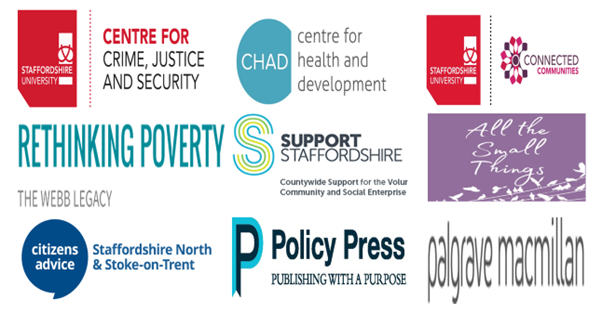
September 18th and 19th 2023 at Staffordshire University, Stoke on Trent Campus
This year’s Action on Poverty Conference at Staffordshire University is on our Stoke-on-Trent campus and is taking place on Monday 18th and Tuesday 19th September 2023. This is a free event for the anti-poverty sector to come together to learn and share practice and is part of the Social Justice agenda of the Centre for Crime, Justice and Security via our Action on Poverty team in partnership with CHAD research centre, the Connected Communities team, Rethinking Poverty, All The Small Things CIC and Support Staffordshire.
To give you a taster of the event – here is a promo video from last year where you will hear from Citizens Advice North Staffs and Stoke and the Joseph Rowntree Foundation https://youtu.be/DOButx4d3Tg. This year we anticipate people from the voluntary and public sectors coming together from across the UK to explore the issues and solutions to addressing poverty.
Conference speakers at this year’s event include leaders from the Rethinking Poverty network, Joseph Rowntree Foundation, Citizens Advice North Staffs and Stoke and academics from Staffordshire University, Hull University and Heersink School of Medicine at the University of Alabama at Birmingham. A series of breakout sessions are planned and currently include writing bids and commissioning anti-poverty work, climate change and poverty, food poverty, liaising with the media, approaches to co-creating with people with lived experience, working with asylum seekers and recruiting and working with volunteers. A market stall area will enable you to find out more about organisations tackling poverty and to purchase relevant books. More will be added to this programme and you are invited to propose delivering a breakout presentation or facilitating a market stall stand – please get in touch with Sarah.Page@staffs.ac.uk to find out more about how your research, campaign or organisation can be involved in the conference programme.
This year, Bristol Policy Press is sponsoring and attending the event and have a range of anti-poverty resources that you may be interested in: https://policy.bristoluniversitypress.co.uk/the-escape-from-poverty A couple of Palgrave authors will be sharing their insights at the conference and you will be able to purchase their books at the Policy Press stand.
To book onto this year’s event, please do so via this Eventbrite link Action on Poverty Conference Tickets, Multiple Dates | Eventbrite. Staffordshire University are working with a number of local and national collaborators on this event. If you want more details on how your organisation might have a stand at the event or deliver a short talk, then please contact Sarah.Page@staffs.ac.uk The conference will also be a launch for the new online Masters degree in Leadership in Action on Poverty, which the University is starting this October 2023 – for more details about the Masters degree please contact Julie.Tipping@staffs.ac.uk and we will be launching our new Action on Poverty in the UK book at the end of the conference. This book emerged following the hosting of our first Action on Poverty conference in the summer of 2022 and is collection of chapters designed to provoke conversation and discussion about poverty and hardship from a number of activists and academics working in the field, published with Palgrave.
Centre Success with the Professorial Conferment Committee
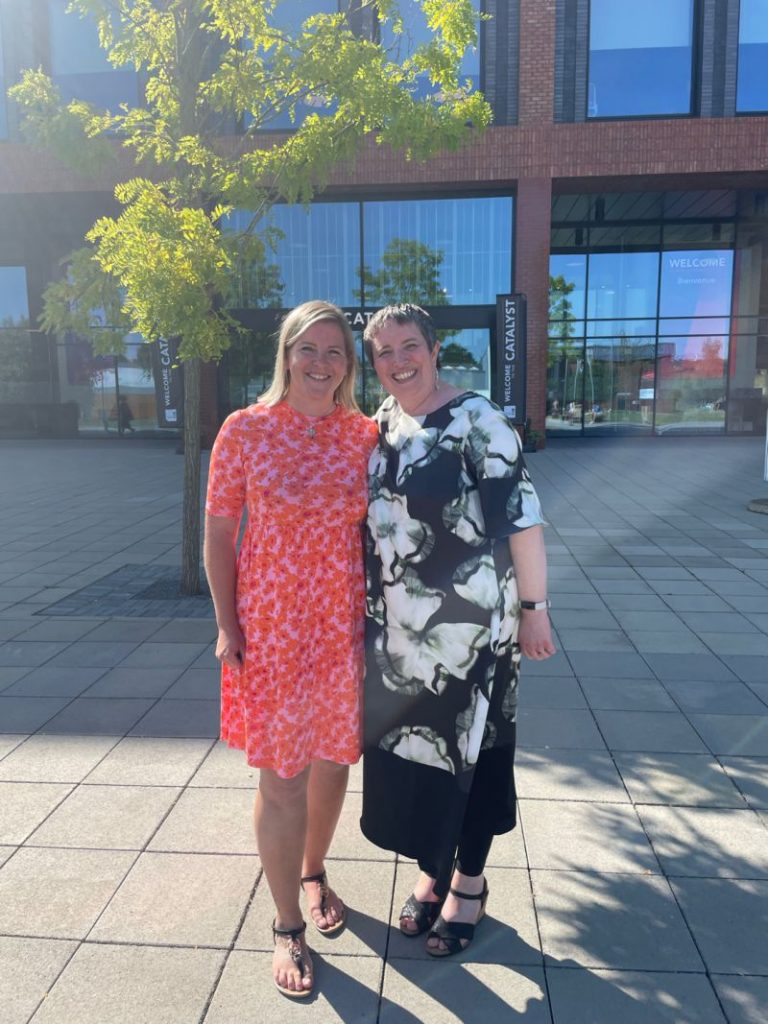
The Centre for Crime, Justice and Security is delighted to announce that our Theme lead Laura Walton-Williams and our Mentoring lead Sarah Page have been successful in the Associate Professorship Call 2023! A massive congratulations to both on this wonderful achievement.
British Academy/Leverhulme Successful Bid

Associate Professor in Modern History Tony Craig has secured over £8000 from the British Academy/Leverhulme Small Research Grants fund.
Tony’s research will assess the effectiveness of state information produced and disseminated by the Northern Ireland Office (NIO) from its creation in 1972 until the Good Friday Agreement of 1998.
During this time, information products were consistently created and distributed to regional, national and international audiences, for both public and private consumption. Products included radio, newsprint, and TV advertisements along with briefing materials, books and even news copy.
The research will identify and evaluate the extent to which such products established hegemonic narratives in line with NIO policy thereby harnessing political power and making an important contribution to the early peace process in Northern Ireland. It is anticipated that this work will compliment contemporary debates about the relevance of force in Northern Ireland, illustrating the developing sophistication of state soft power along with its effectiveness and utility at an important moment in the history of Northern Ireland.
CCJS Submissions to Parliamentary Enquiries and the United Nations Human Rights Council
Members of the Centre for Crime, Justice and Security have submitted evidence to two parliamentary inquiries and to the United Nations Human Rights Council in early 2023.
Professor James Treadwell, Professor Ian Acheson and Dr Helen Poole submitted evidence to the House of Commons Justice Select Committee Inquiry examining the prison operational workforce.
Sarah Page, Sarah Plimley, Lucy Pointon and Dr Jo Turner submitted evidence to the House of Commons Digital, Media and Sport Select Committee inquiry, looking at the Government’s approach to the regulation of gambling.
Dr Sam Spence submitted a contribution to the United Nations Human Rights Council concerning violations and abuses of human rights rooted in harmful practices related to accusations of witchcraft and ritual attacks, as well as stigmatization. To view the full report click HERE
Parliamentary Responses

John McGarry: The Government and Parliamentary Lead
Written evidence submitted by Dr John McGarry, Senior Lecturer in Law, Centre for Crime, Justice and Security Download
Joint Committee on the Fixed-Term Parliaments Act Download
Womens’ Lived Experiences of Treatment for Drugs and Alcohol: CCJS Research Collaboration
Two research centres (the Centre for Crime, Justice and Security and the Centre for Health and Development) at Staffordshire University have collaborated on a research project exploring the lived experience of women who use drugs and alcohol and their treatment pathways.

The research project has been commissioned by West Midlands OPCC and the JABBS Foundation and has been delivered in partnership with the Centre for Justice Innovation and Expert Citizens CIC. Service users and professionals have taken part in research conversations via interview, focus group and world café. The project has been co-designed and co-delivered with lived experience experts.
The project advocates for greater investment into women’s treatment services as current systems and structures create climates for increased likelihood of domestic abuse, sexual exploitation, and modern slavery, as well as often impeding the engagement of women. The value of delivering services to women in women-only spaces is that it allows for women to safely disclose previous experiences of victimisation that have contributed to using drugs and alcohol to self-medicate and escape painful memories and present victimisation. This work backs the need for enabling women to access services that meet their needs, that work for women, and which are gender and trauma informed, providing safety from ongoing violence.
For more information about this research contact sarah.page@staffs.ac.uk
’50 Dark Destinations’ Book Launch
Professor James Treadwell launches new book 50 Dark Destinations: Crime and Contemporary Tourism.
Alongside fellow editors Adam Lynes and Craig Kelly of Birmingham City University, Professor James Treadwell has released an exciting new edited collection exploring the harms of contemporary tourism.

“From the Alcatraz East Crime Museum and Jack the Ripper guided tours to the Phnom Penh killing fields, ‘dark tourism’ is now a multi-million-pound global industry. Even in the most pleasant tourist destinations, underlying harms are constantly perpetuated, affecting both consumers and those who work or live around such tourist hotspots. Highlighting 50 travel destinations across six continents, expert criminologists, psychologists and historians explore the past and contemporary issues which we often disregard during our everyday leisure.”POLICY PRESS
For reviews, further info and to purchase 50 Dark Destinations, click HERE
NEW ARTICLE PUBLISHED: Dr Leanne Savigar-Shaw has a new article published in Policing and Society
Dr Leanne Savigar-Shaw has recently had a new exciting piece of work investigating the capacity of Procedural Justice Theory (PJT) in explaining the dynamic interactions between police and citizens within the context of police detention. The article entitled ‘Procedural justice as a reward to the compliant: an ethnography of police–citizen interaction in police custody’ considers the role of fairness and procedural justice in police engagement with detainees in police custody. The article can be found here: https://www.tandfonline.com/doi/full/10.1080/10439463.2021.1960332
Centre Researcher Leads on Arrest for the Murder of Joshua Harmon
Zack Kowalske, one of our PhD researchers who is a serving detective and forensic scientist in Georgia (USA), recently brought a child murder case to resolution with the arrest of a suspect through the use of DNA. Zack had been working on this case for the past few years and this week was able to secure arrest warrants for the suspect, James Coates in the 1988 murder of 8 year-old Joshua Harmon. Find the story here and the press conference here.
Space
NEW PARTNERSHIP: The Wildlife Forensic Academy
The Wildlife Forensic Academy is the world’s first of its kind for the mobilisation of wildlife forensic knowledge and expertise. The Academy delivers courses to professionals in the field of conservation and study abroad programs for international students. The Academy is based one hour from Cape Town at Buffelsfontein Nature and Game Reserve, South Africa. In the experience laboratory students are taught about wildlife crime, poaching, trade and trafficking, the dangers of zoonoses, the extinction of wildlife and the role of Forensic Science. Through the mobilisation of forensic knowledge, we aim to deliver our contribution to stop wildlife crime and bring poachers to justice. Our new partnership will:
- Share research and practice through Wildlife Forensic Academy collaborators
- Share opportunities to exploit research funding calls
- Promote and develop new training initiatives for students (all levels) within the Wildlife Forensic Academy incl. placement opportunities, research internships and participation in courses
- Identify other areas of potential collaboration, for example through activities and work undertaken by the Centre for Crime, Justice and Security, including but not limited to consultancy, quality standards work, enterprise activities and combined bids for funding
Space
NEW ARTICLE PUBLICATION: Authored by Christopher Morris, a lecturer at Staffordshire University. Click the image below to read more!
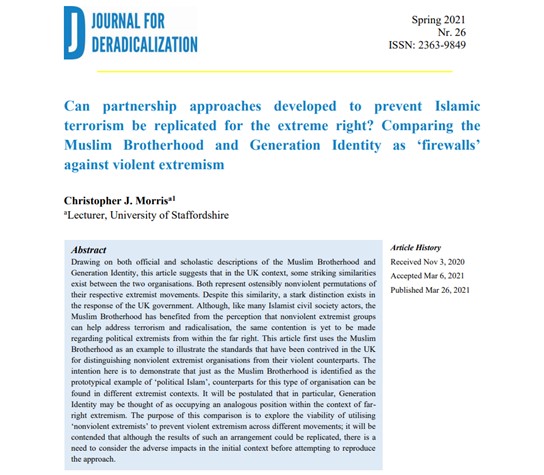
Space
Poly-char 2021 Virtual Conference

Prof Claire Gwinnett delivered a plenary presentation at this year’s Poly-char 2021 virtual conference (POLY-CHAR 2020 [VENICE] – Homepage | POLY-CHAR 2020 [VENICE]) . Poly-char is the international polymer characterization forum which focusses on international collaboration, on the promotion of young scientists and on fostering a collegial research environment. The forum has the tradition of empowering young scientists, motivating them towards a future in polymer science. The main aim of the conference was to promote international collaborations, inspire a new generation of polymer scientists and address global challenges by encouraging modern multidisciplinary science and technology. Prof Gwinnett delivered a session entitled ‘Polymer Analysis in Forensic Science: Answering the ‘Who?’, ‘What?’, ‘Where?’, ‘When?’ and ‘How?’ of a Crime’. For the presentation synopsis, please see here.
Space
Rachel Bolton-King’s Winston Churchill Memorial Report
Rachel’s project involves meeting with and shadowing law enforcement agencies, forensic scientists, lawyers, Government officials and researchers to learn how existing and emerging technologies are used to detect, investigate, track, trace, solve, prevent and reduce gun crime in South Africa, USA (California) and France.
The aim of this research is to determine which technologies and/or best practices work best, and which could be applied in the UK to further enhance the work we already do.
S
NEW ARTICLE PUBLICATION: Authored by Luke Telford. Click the image below to read more!
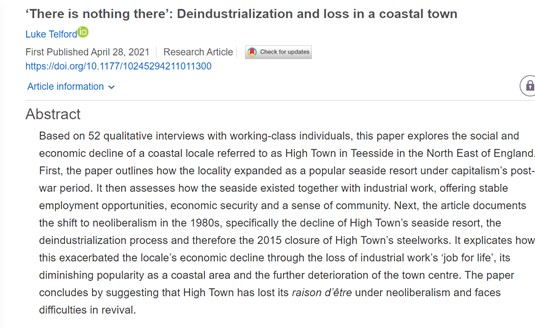
TWO NEW ARTICLE PUBLICATIONS: Authored by Leanne Savigar-Shaw, the Centre Theme Lead for Evidence-based Policing. Click the images below to read more!
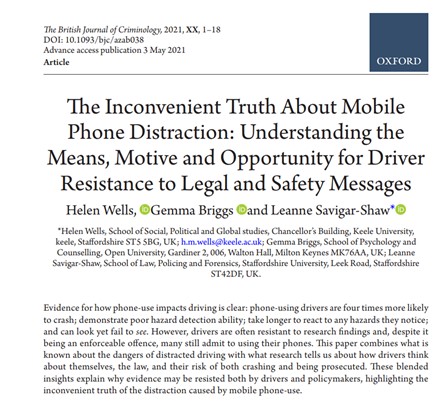
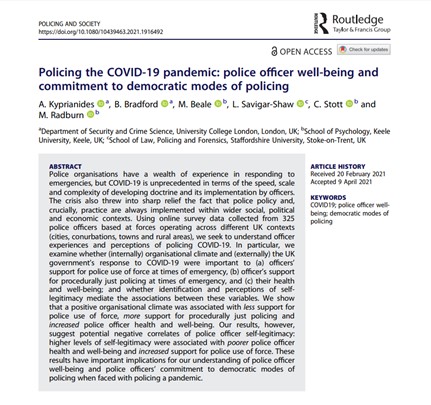
Heading
NEW ARTICLE PUBLICATION: Co-authored by Dr Luke Telford, member of the Centre for Crime, Justice and Security. Read more by clicking the image below!
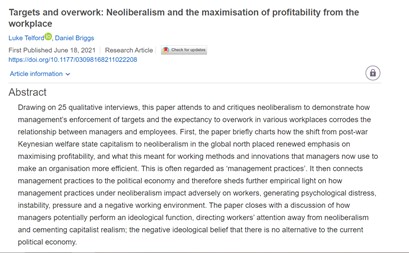
Heading
Episode 3 of CrimeTapes is now available. Professor James Treadwell, a Centre theme lead, and Hannah Bennett, a PhD Researcher and member of the Centre, discuss prisons and imprisonment, and the ongoing struggles of policing radicalisation versus rehabilitation post-conviction.

